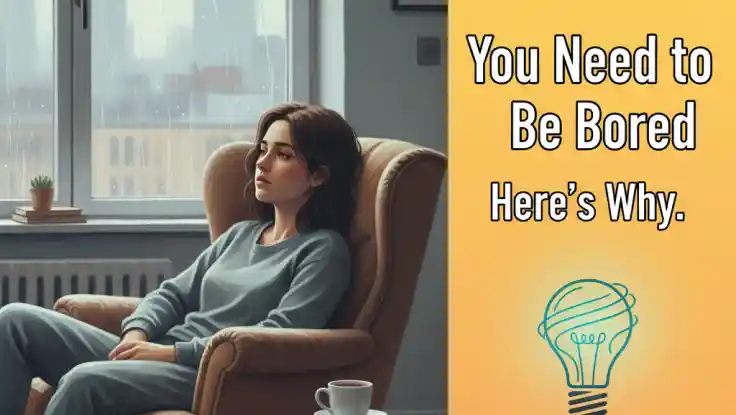Arthur Brooks explains why boredom is essential for meaning, how phones kill our ability to think deeply, and simple rules to reclaim happiness through boredom.

Table of contents
Open Table of contents
The Shocking Experiment
My colleague in the psychology department at Harvard, Dan Gilbert, did experiments where people had to sit in a room for 15 minutes. The instructions: do absolutely nothing. There was nothing in the room to do, except a button. If you pressed the button, you gave yourself a painful electric shock.
Here was the choice: sit there bored, or shock yourself.
A big majority of the participants chose the shock. That’s how much we hate boredom.
Why Boredom Feels Bad
The reason boredom feels so terrible is because the default mode network sends our minds wandering—toward uncomfortable questions. Like: What does my life mean? Am I living with purpose?
Those big existential questions are not easy. But they are important. In fact, they’re essential for happiness.
And here’s where the problem lies. Today, we’ve nearly eliminated boredom. We’ve almost completely shut off the default mode network.
How?
That little thing in your pocket with the glowing screen.
At a stoplight for 15 seconds? Out comes the phone. Waiting in line? Out comes the phone. Anytime boredom creeps in, we swipe it away. That creates what I call a doom loop of meaning. If you never let yourself be bored, you never confront the big questions. And that’s a recipe for depression, anxiety, and the hollow feeling so many people struggle with.
The Prescription: Be Bored More
You don’t want to be bored. But you need to be bored.
Tomorrow, try this:
- Go to the gym without your phone. No podcasts. No music. Just your thoughts.
- Commute in silence. No radio, no scrolling. Just your head.
- Build up your tolerance for 15 minutes of pure boredom.
Do this and you’ll notice:
- You’ll be less bored with everyday life—your job, your relationships, even small things around you.
- You’ll start digging into the deepest questions of meaning, purpose, and significance.
- And you just might feel happier.
My Own Rules
People ask me all the time, “Arthur, are you taking your own prescriptions?” And the answer is: yes. I’m as prone to these pathologies as anyone else, because I’ve got the same brain chemistry.
Here are the rules I live by:
- No devices after 7:00 pm.
- No sleeping with my phone.
- No phones at meals. Meals are for family, not strangers on the internet.
- Regular social media fasts. Days or weekends with zero screens.
At first, it feels like kids screaming in my head—my dopamine yelling: check your phone, check your phone! That’s addiction. But after a while it calms down, and I feel blessed.
Sure, I eventually pick the phone back up. I still have emails, I still need to function in the modern world. But these resets remind me: my life doesn’t revolve around the device.
What If I Miss Something?
People worry they’ll miss out. But the truth is—almost nothing is urgent. Your phone can still let through one or two emergency calls. Use that feature if you must.
But let’s be real: Twitter is not an emergency. The news can wait. Your grandparents didn’t know every second what was going on in Washington, DC, and they survived just fine.
Honestly? We’re killing ourselves with this stuff.
So let me say it straight—first to my kids, and then to you:
Put down your phones. You need more meaning in your life. And so do I.